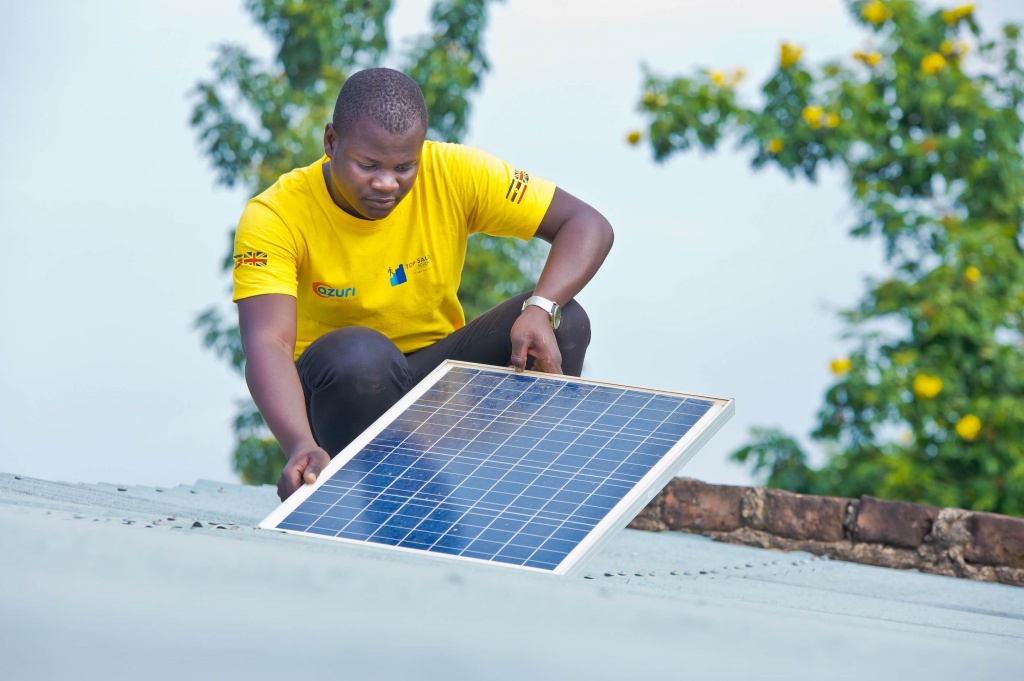
UK solar power firm Azuri Technologies is among the companies to be backed by the crowdfunding platform. The Energise Africa’s projects have helped 452,000 people across Africa to stop using toxic kerosene to power their homes, cutting CO2 emissions by 100,000 tonnes.
Over 200 investors from across Scotland are fighting climate change through Energise Africa, a UK aid backed crowdfunding platform, which helps African communities access solar energy. The platform demonstrates the UK leading by example in the run up to the crucial climate change conference COP26 in Glasgow later this year.
Since its launch in 2017, the platform’s projects have helped 452,000 people across Africa to replace toxic kerosene with clean solar electricity in their homes, helping reduce CO2 emissions annually by 100,000 tonnes.
So far £15 million has been invested through the platform, including £11.3m through crowdfunding. UK aid has provided match funding in 70% of projects to encourage UK investors to join the campaign.
The success of Energise Africa in harnessing the demand from Scottish investors to find environmentally friendly ways to invest comes ahead of the UN Climate Change Conference (COP26) due to be held in Glasgow in November.
The UK Government launched the Year of Climate Action earlier this month to inspire people across the UK to take positive action on climate change in the run up to COP26.
Energise Africa sets projects crowdfunded on its platform a limited number of days to raise their capital. People can invest as little as £50 in a specific project in the form of a fixed term bond and earn a potential interest rate of to 7%.
UK International Development Secretary Anne-Marie Trevelyan said: “UK aid is helping people in Africa use more solar energy, which ultimately will benefit us all in creating a cleaner planet. People across Scotland are playing a crucial role in this transition.
“As well as helping to tackle climate change, Energise Africa, backed by UK aid, is also giving everyone across the country the chance to earn potential interest on their investment.” Secretary of State for Scotland Alister Jack said: “It’s great to see Scots fighting climate change as part of these UK aid funded projects, especially in the year Glasgow will be hosting the COP26 global climate conference.
“Not only does it benefit communities in Africa but it also shows what a difference can be made when we work together to make more eco-friendly changes.”
The platform uses investors’ money to buy solar power systems such as roof panels, which are then sold to households and businesses in Africa. Instead of buying Kerosene, these customers save money by making affordable monthly payments until they own the solar power systems outright. This normally takes between 12 and 24 months, after which the power is free.
Energise Africa’s projects include supplying lights for fishing in Tanzania and fridges for farmers in Kenya, as well as helping off-grid families in Mozambique access energy. These projects change lives, allowing children to study in the evenings and people to cook in their homes without creating harmful fumes. They can also reduce food spoilage for farmers, increasing their profits.
Rob Kay, an Energise Africa investor from Kilsyth, said: “My wife and I are passionate about green energy and installed solar power in our own home in 2013. When I came across Energise Africa, it seemed like the perfect way to tackle climate change, help lift African communities out of fuel poverty and earn interest on a bit of surplus cash.
“I was particularly drawn to a project with a company called Azuri who provide power to family homes. I liked the thought of helping parents and their children, and the project had the added benefit of getting match funding from UK aid, helping my investment go even further.”
Julie Green, an Energise Africa investor from Glasgow, commented: “I like investing with Energise Africa because it tells a community, or even an individual family, that I want to help them build a sustainable future in their home. It isn’t about investment from ‘here’ to ‘there’, it’s recognising that by investing in green energy in one place I’m trying to create a globally sustainable future for us all. As far as I’m concerned, that’s money well spent.
“The first project I invested in was a solar energy scheme in rural Kenya: I was drawn to that one because the company’s strong track record for this kind of work made it seem like a good place to start. Since then, I’ve re-invested the money in projects in Zambia and Uganda.”
Astines Okoth from Nyakach in Kenya now has solar power in his home, which was installed by energy company Azuri with funding from Energise Africa. He said: “Having access to solar power at home has really changed life for me and my wife, who has cancer.
“Electricity at home means she can watch television to take her mind off the pain, and we use the money we save by not buying kerosene on medication to treat her condition. My son can now also use electric light to study in the evenings, improving his chances of succeeding at school.”
Pamela Adhiambo is a healthcare worker from Siaya in Kenya and has solar power at home, installed by Azuri. She commented: “Before I had electricity at home, I couldn’t spend as much time treating patients as I had to get home before dark to compile reports. Now I have solar power, I can spend more time helping people during the day and write reports in the evening.”
Kindly follow us on twitter:@AfricanVoice2










